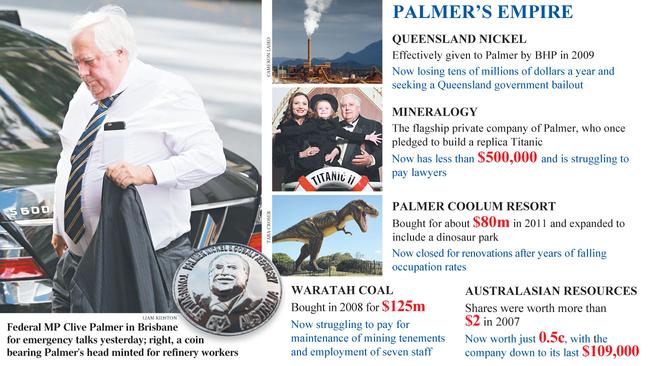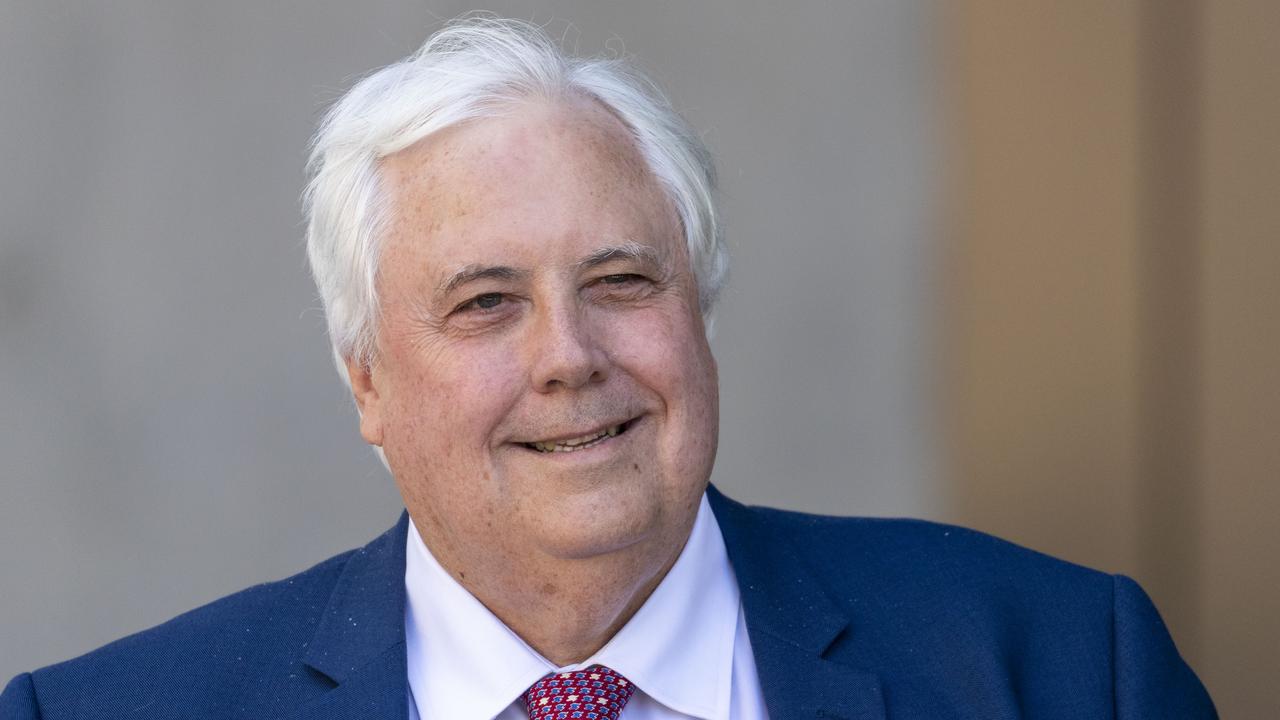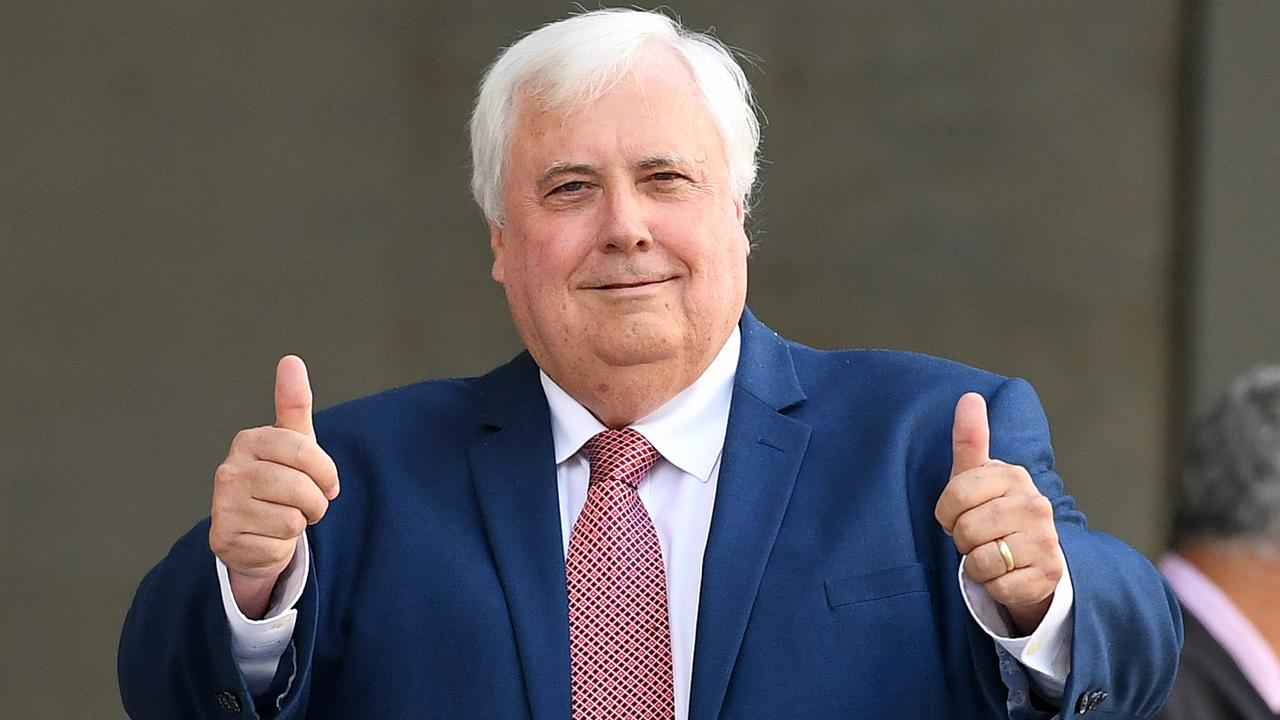Clive Palmer hid nickel refinery’s woes for months
Clive Palmer has asked the Queensland government for a $40m bailout to keep his nickel refinery afloat.

Clive Palmer has asked the Queensland government for a $40 million bailout to keep his Townsville nickel refinery afloat as legal documents revealed he hid the “dire” financial state of the business from staff and management for more than three months.
The embattled federal MP met Queensland Treasurer Curtis Pitt yesterday to seek a loan guarantee just hours after Premier Annastacia Palaszczuk confirmed that Queensland Nickel had not provided documentation in recent weeks for a government-commissioned probe of its books.
It is understood the Queensland government had already ruled out a cash bailout of the company, amid concerns about the existence of tens of millions of dollars of unserviced loans between Mr Palmer’s web of companies.
Mr Palmer has also refused to sell off his Coolum Resort, on the Sunshine Coast, or dip into his private wealth to keep Queensland Nickel in operation and save 776 workers from losing their jobs should the refinery be put into administration.
Mr Pitt attacked Mr Palmer for issuing an ultimatum weeks before Christmas.
“We are seeing people’s livelihoods being part of some kind of a bargain with government,” the Treasurer said. “Let me be clear: any decision to close the Yabulu nickel plant will be the decision of Mr Palmer and his alone.’’
Mr Palmer asked for the bailout after the West Australian Supreme Court on Monday rejected his urgent attempts to obtain $US48 million ($66m) in funding from his estranged Chinese business partner Citic to keep the refinery afloat.
According to an affidavit filed in the court, Mr Palmer and his nephew, Clive Mensink, the managing director of Queensland Nickel, decided to keep workers in the dark about the company’s plight after discovering in August that the refinery would run out of cash. In the affidavit, Queensland Nickel chief financial officer Daren Wolfe said the company became aware of the looming cash flow shortage at the end of August.
“The detailed cash flow analysis and dire position that would cause for QN has been kept confidential at the request of Mr Mensink and Mr Palmer, so as not to alarm other senior management and employees at the refinery,” Mr Wolfe said in his affidavit.
Mr Mensink swore another affidavit that he would lay off the entire workforce at the refinery and push the company into administration by yesterday if the court did not order China’s Citic to pay Mr Palmer.
The affidavits from Mr Wolfe and Mr Mensink had been subject to a confidentiality order, but that was lifted during Monday’s court hearing.
In his affidavit, Mr Mensink left no doubt that the refinery would be closed and the workers sacked if the court case did not rule in Mineralogy’s favour.
“My view is that I can’t properly delay the termination of employment and placement of QN into administration until 8 December 2015, if an order for payment for the benefit of QN is not made,” he said in the affidavit sworn last Thursday.
The revelation that Queensland Nickel knew in August that it was running out of money contrasts with Mr Palmer’s public comments since then. Last month, he released a statement saying Queensland Nickel was debt-free and had net assets of more than $1.9 billion.
He stated that “as long as I am the owner of Queensland Nickel, I will not allow the company to borrow funds from the Queensland government”.
The revelations also raise questions about the financial accounts QNI Resources lodged with the Australian Securities & Investments Commission in September.
West Australian Supreme Court judge Paul Tottle on Monday dismissed Mineralogy’s application for $US48m in funding from Citic, and questioned whether Mr Palmer and Mr Mensink had exhausted all options to save the refinery.
Despite the sworn threat from Mr Mensink, yesterday passed without the refinery being shut down or the workforce laid off.
Mr Palmer is understood to have originally sought assistance from the Queensland government to secure a $25m loan, before raising the price to $28m and then settling yesterday on $40m. It is understood the state government is concerned about exposure to wider financial distress within Mr Palmer’s companies.
In recent days, Mr Palmer has provided some information to the government-commissioned probe by KPMG to independently investigate options to keep the refinery afloat.
In a statement, Mr Palmer said he was seeking “minimal assistance’’ from the Queensland government to ensure continued operation of the Townsville refinery while the nickel price was low.
He said forecasts showed the operation would be self-supporting by mid-next year: “The Queensland government needs to put welfare of these Townsville families highly on the agenda.”
Additional reporting: Sarah Elks


